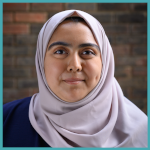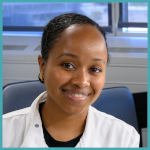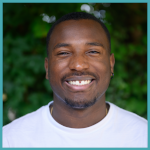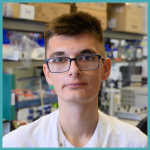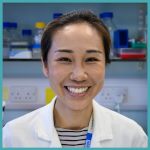The below testimonials were collated by Alia, one of the 2022 EPLS interns. Photographs by Mark Morgan.
Alia Boda
Bsc (Hons) Human Biology and Infectious Diseases
University of Salford
From a spider invasion to the oven being on fire, we created memories I had never thought of doing one day. It was my first time moving away from home and I was hesitant to apply for the EPLS programme to begin with. With a lot of support and encouragement, I built the courage only because I knew I probably won’t make it through and I was definitely wrong about that.
During my 8 weeks, I created connections and bonds with not just the interns and organisers but with people from the lab and around Cambridge. I learnt a lot about myself along with really putting my theoretical knowledge into practice. During my time at Cambridge, I was in the Hodson lab at the Wellcome-MRC Cambridge Stem Cell Institute. My project during these 8 weeks was CRISPR editing to model cancer genetics; specifically, Diffuse Large B-Cell Lymphoma (DLBCL). This allowed me to design and clone gRNA for specific target genes to study and understand its role played within DLBCL.
Besides the skills the EPLS programme helped me develop, it made me much more independent, patient and confident. I was able to travel each weekend back home (a 6 hour journey back and forth to go collect food (I couldn’t cook for the life of me). With the amount of train cancellations and changes, I was able to work on skills such as problem solving.
I was fortunate to network with other people within Cambridge to get a better insight about their careers, along with tips to truly find what I wanted to do.
Mimi Tambi
BSc Biomedicine
Birkbeck College, University of London
I almost didn’t apply to the EPLS programme because in all honesty I thought that Cambridge was out of my reach. Now, having just completed the eight-week programme, I cannot believe that I almost allowed my imposter syndrome to get the better of me!
I have had an incredible summer working in a research laboratory on malaria parasites. I have worked in a CL3 lab and have been able to carry out experiments that would not have been available to me at uni as an undergraduate.
The programme has given me a much clearer idea of what the life of a PhD student really entails, as well as giving an insight into the myriad of career paths you can pursue with a PhD. My PI, supervisor and the programme organisers were so incredibly supportive and have been genuinely invested in my progression and success.
In addition to the practical wet lab skills, I have gained experience in computational biology and developed my presenting skills. I now have a much clearer picture of my post- graduation plans, and most importantly, my confidence has grown so much that I will definitely not hesitate to put myself forward for new opportunities!
Bruce Veloso
Biomedical Science
University of Salford
From the 11/07/2022 to 02/09/2022 I have had the privilege of working as a research intern for the University of Cambridge in the Department of Public Health and Epidemiology. During my 8 weeks as a research intern, I have been exposed to new knowledge and people that have helped me to flourish as a young academic. My time, here in Cambridge, was brief and it is now over. I feel like I have grown immensely as a person both professionally and personally and have achieved new heights. Being here has broadened my horizons and helped me to be much more hopeful for the future of the communities I come from, and my ability to leave the world a little bit better than when I first found it.
On the first day when we trained to use the statistical program “R studio”, I was on the verge of tears, as I found my first coding experience challenging. But with the help of a very supportive supervisor, Dr Katie Saunders, I soon learned to navigate through the various assignments. As well as R, I enjoyed seminars on topics that cover what it means to be a scientist, how to communicate science to the general population or how to apply for masters and PhD degrees.
My internship was mainly centred around my choice of topic: public health. As well as my supervisor, I had opportunity to meet Drs Andrew Blagborough, Janet Dean and Matthias Landgraf, who organised the Experience Post Graduate Life Sciences.
For the first few weeks I felt a bit like an alien in Cambridge and struggled to find the confidence that feelings of imposter syndrome robbed me of. Despite this, my supervisor and the program organisers made me feel very welcome and were also very supportive which made my experience with the program much nicer.
Lastly, my supervisor gave me the opportunity to participate during a Rand Europe staff meeting, were I met Jon Sussex, who is the chief Economist for the non-charitable company and I briefly spoke to him (hopefully he’ll remember me in a few years time). As well as this, I have had the chance to attend a symposium organised by PhD students here in Cambridge, were students made posters and presented their research. During the symposium, I was very fortunate to meet one of the speakers on that day Dr Jason Mellad, who is a Cambridge PhD alumnus and also the CEO of Start Codon. After this brief encounter, myself and another intern, were able to meet Dr Mellad at his office, where we discussed our goals and Dr Mellad offered to act as a mentor for the both of us. That was really cool and generous of him to do.
I will strive to keep on making the most of the opportunities given to me. All in all, I am very grateful for the opportunity to take part in this amazing program.
Hubert Ziebicki
Biomedical Science
University of Plymouth
I really enjoyed my time on the EPLS programme, and think it was very beneficial to me and my future. I got to develop my lab skills quite extensively, actually, and get reasonably comfortable with new practical techniques that I never even heard of beforehand in the 8 weeks I’ve been there (e.g. calcium imaging neurons and molecular cloning). This, in addition to the education we’ve been given regarding the structure and workload of PhD programmes, makes me feel quite a bit more comfortable with applying to those, should I decide to go in that direction in the future.
Regarding changes in perception, the main thing for me was that while I used to see Cambridge as quite posh, elitist, and very high-class, I now see it as a bit more approachable and somewhere where I could see myself someday.
But aside from the academic benefits, this was also my first time living on my own for a longer period of time, and I found this to be a new but very formative experience, and I think I did quite well. I had to learn to manage my money and finances as efficiently as possible, plan my shopping and meals in advance, amongst other things - all of which took good organisation and time management.
Cambridge is also a very different town from Plymouth, where I live, with a much different ‘vibe’, but I liked it. It’s much older - which also means very narrow streets in some parts - but also much flatter so I very much enjoyed being able to cycle everywhere without having to take on huge hills that felt like Mt Everest every time. I think one of my favourite moments on the programme was when we all got together to play croquet over some free pizza - a sport I’ve never played before, but it was loads of fun (especially winning against Jemima and Dan!).
Lastly, of course, I got to meet and connect with all of the lovely interns on this programme, my lovely lab supervisors and PIs, and the organisers of the programme which I thank dearly for this opportunity.
Jemima Bittor
Biomedical Science
University of Warwick
I was amazed when I got the news of being accepted to participate in the programme. The idea of coming to Cambridge in the summer was all I looked forward to and created in me the zeal for education and science which was something I had been missing for a while. Honestly speaking, before coming here I expected the internship to be academically heavy as Cambridge is one of the best universities in the world.
However, when we got here it was full of experiences, furthering the scientific knowledge we already know and improving our interpersonal skills. I absolutely loved this programme as not only was I given the opportunity to explore Cambridge as a university and city but also learn a whole lot from networking with people in the field I was interested in, to experiencing the life of a PhD student. One thing I will definitely miss is seeing the cows every morning whilst walking to work even though at first I was scared of them and had to walk alongside somebody to get past them. It somehow became a routine.
Croquet was another thing I found quite unusual as a sport, but it's fun when you get the ball through the hole. I do not have any particularly favourite moment as I pretty much enjoyed every day, from the excitement of going into the lab, to my colleagues making jokes about sandwiches, to enjoying Aromi gelato after work. Overall, it was an amazing experience and would definitely do it again if given the chance to. A massive thank you to the organisers and sponsors also.
Samantha Cheng
Biomedical Science
Brunel University London
I became more confident in cycling and can only hope that London will eventually become as cyclist friendly as Cambridge. The best part about the experience, aside from feeling very accomplished with the research I have achieved, are the people. From the scientists and staff at the Division of Virology, who made me feel so welcome, to my fellow interns who became my Cambridge family for eight weeks.
One of the most memorable and fun experiences was when a big group of us took a night time walk to Jesus Green to watch the Perseid meteor shower.

